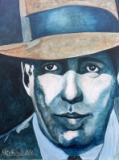Harlem Renaissance
In the early 1920's there was a movement called the "Negro" or "Harlem Renaissance". This resurgence of literature, knowledge, and the arts coming out of New York was powerful.

Nicknamed Lady Day by her friend and musical partner Lester Young, Billie Holiday was a seminal influence on jazz and pop singing. Her vocal style, strongly inspired by jazz instrumentalists, pioneered a new way of manipulating phrasing and tempo. Above all, she was admired all over the world for her deeply personal and intimate approach to singing. Billie Holiday co-wrote only a few songs, but several of them have become jazz standards, notably "God Bless the Child," "Don't Explain," "Fine and Mellow," and "Lady Sings the Blues." She also became famous for singing jazz standards including "Easy Living," "Good Morning Heartache," and "Strange Fruit."
Billie Holiday was born Eleanora Fagan on April 7, 1915, in Baltimore, Maryland. She borrowed the name "Billie" from one of her favorite movie actresses, Billie Dove. Holiday was born in Baltimore in 1915. She endured a hard childhood, her musician father left the family early, and her teen age mother wasn't able to keep her consistently which resulted in Billie often being put in care of relatives who abused her. She was raped at age 11 and grew up in poverty. She sums it up best in the first line of her famous autobiography Lady Sings the Blues, "Mom and Pop were just a couple of kids when they got married. He was eighteen, she was sixteen, and I was three."
She experienced a lifetime's worth of hardships by the age of 17, including working as a prostitute and being jailed at a correctional facility before finally finding her calling as a singer. Throughout the history of entertainment, many famous figures have gone through drug treatment, with some of them even getting arrested for drug-related offenses.
Settling in Harlem, Holiday began singing informally in numerous clubs. Around 1932 she was 'discovered' by record producer John Hammond at a club called Monette's. Hammond arranged several sessions for her with Benny Goodman; her first-ever recording was 'Your Mother's Son-In-Law' in 1933. In 1935, Billie Holiday had a small role as a woman being abused by her lover in Duke Ellington's short Symphony in Black: A Rhapsody of Negro Life. In her scene, she sang the song "Saddest Tale."
By the late 1930s, Billie Holiday had toured with Count Basie and Artie Shaw, scored a string of radio and retail hits with Teddy Wilson, and became an established artist in the recording industry. Her songs "What A Little Moonlight Can Do" and "Easy Living" were being imitated by singers across America and were quickly becoming jazz standards. In 1938, Holiday's single "I'm Gonna Lock My Heart" peaked at number two on the pop charts.
Holiday was recording for Columbia in the late 1930s when she was introduced to "Strange Fruit", a song based on a poem about lynching written by Abel Meeropol, a Jewish schoolteacher from the Bronx. Meeropol used the pseudonym "Lewis Allan" for the poem. It was eventually heard by Barney Josephson, proprietor of Café Society, an integrated nightclub in Greenwich Village, who introduced it to Holiday. She performed it at the club in 1939, with some trepidation, fearing possible retaliation. Holiday later said that the imagery in "Strange Fruit" reminded her of her father's death and that this played a role in her resistance to performing it.
When Holiday's producers at Columbia found the subject matter too sensitive, Milt Gabler agreed to record it for his Commodore Records. That was done on April 20, 1939, and "Strange Fruit" remained in her repertoire for twenty years. While the song's release did not get any airplay, it sold well, though Gabler attributed that mostly to the record's other side, "Fine and Mellow", which was a jukebox hit. "The version I did for Commodore," Holiday said of "Strange Fruit", "became my biggest selling record." "Strange Fruit" was the equivalent of a top twenty hit in the 30s.
For her performance of "Strange Fruit" at the Café Society, she had waiters silence the crowd when the song began. During the song's long introduction, the lights dimmed and all movement had to cease. As Holiday began singing, only a small spotlight of light illuminated her face. On the final note, all lights in the club went out and when they came back on, Holiday was gone.
Holiday's popularity skyrocketed after recording "Strange Fruit". She received a mention in Time magazine. "I open Café Society as an unknown," Holiday said. "I left two years later as a star. I needed the prestige and publicity all right, but you can't pay rent with it." Holiday demanded her manager Joe Glaser give her a raise shortly after.
Billie Holiday later worked with such legends as Lester Young, Count Basie, and Artie Shaw, breaking the color barrier along the way by becoming one of the black jazz singers of that era to perform with white musicians. Nevertheless, she was still forced to use the back entrance and forced to wait in a dark room away from the audience before appearing on stage. Once before an audience, she was transformed into Lady Day with the white gardenia in her hair. She explained the sense of overpowering drama that featured in her songs, saying, 'I've lived songs like that'. Even when she was young and singing trivial pop songs, her unique tone and emotional commitment made her performances special.
Billie Holiday's personal life was as turbulent as the songs she sang. Holiday was a dabbler in recreational drug use for most of her life, smoking marijuana, in some accounts, as early as twelve or thirteen years of age. However, it was heroin that would be her undoing. It is unclear who first introduced Holiday to the drug, but there is consensus from historians and contemporaneous sources that she began intravenous use sometime around 1940. In late 1947, she was arrested on drug charges and spent 18 months in a federal reformatory.
Don't miss a single page. Find everything you need on our complete sitemap directory.
Listen or read the top speeches from African Americans. Read more
Read about the great African Americans who fought in wars. Read more
African Americans invented many of the things we use today. Read more
Thin jazz, think art, think of great actors and find them here. Read more
Follow the history of Black Americans from slave ships to the presidency. Read more
Olympic winners, MVPS of every sport, and people who broke the color barrier. Read more
These men and women risked and sometimes lost their life to fight for the cause. Read more
Meet the people who worked to change the system from the inside. Read more

Visit my RedBubble page and use Michael Arnold Art to create greeting cards, T-shirts, mugs, and more.

The variety and impressive numbers of mammals, birds and marine wildlife in Alaska draw visitors from all over the world. For some travelers, Alaska is wilderness, at least compared to what they may know from back home. The pristine wilderness of Alaska is, perhaps, the last vestige of thriving populations of North American wildlife. Where else can you see polar bears, bald eagles, blue and humpbacked whales, gray wolves, grizzly bears, orcas, lynx, moose, and hundreds of other rare and endangered species in their original and undisturbed natural habitats?

Enjoy our website filled with original signed acrylic paintings by award winning Artist Michael Arnold. Located in Citrus County Florida, Michael Arnold is a the editor at the Citrus County Chronicle. When he's not busy being an editor, he is an avid artist who enjoys painting in a variety of styles. We hope you take the time to click on each image to see a larger view and to learn what the artist, Michael Arnold has to say about his paintings.

As dog owners and people who care deeply for animals and wildlife, we wanted our Dog Encyclopedia to be a website that could empower pet owners to create the most positive, loving environment for their dogs. Dog Encyclopedia realizes that owning a dog is like adding a new member to your family.

Floridian Nature has everything your are looking for in Florida nature. The wildlife of Florida is rich and varied, yet most of us are familiar with only a dozen or so species: the "well known endangered species such as manatees and panthers; those, like raccoons and squirrels, that have adapted to urban environments; the frightening alligators and black bears; and those like the armadillo who can't seem to cross the road. Yet they are just a few of the many animal species found in Florida.
